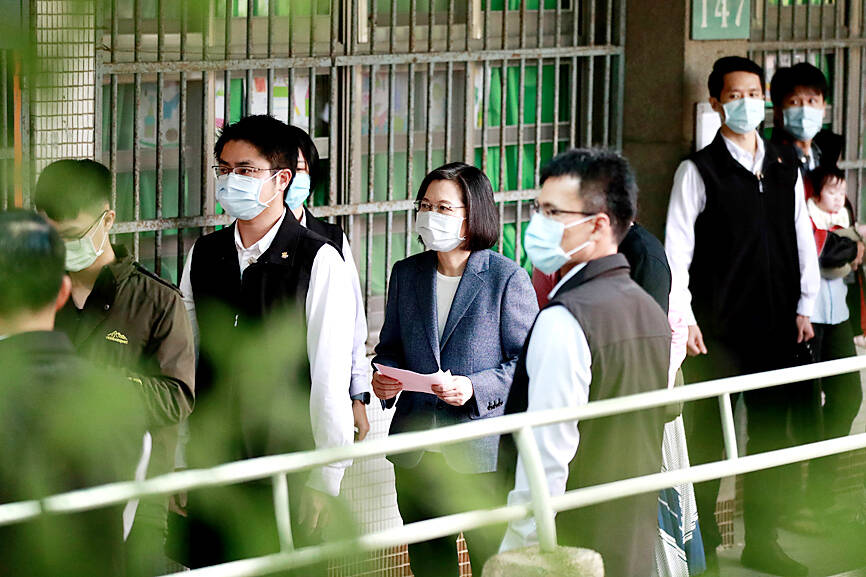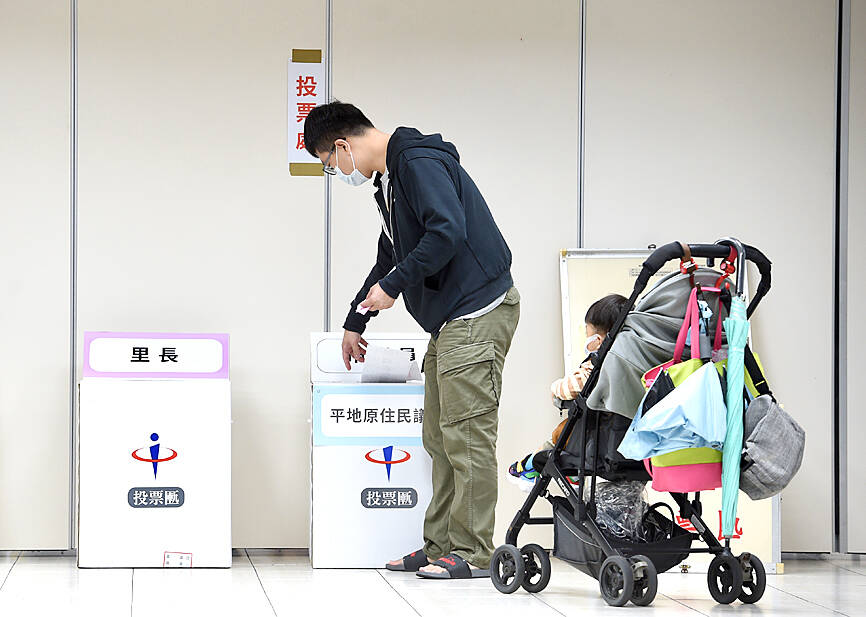Chinese Nationalist Party (KMT) Taipei Mayor-elect Chiang Wan-an (蔣萬安) stood out among his rivals due to his energy, his die-hard supporters and his relative openness to discuss issues such as same-sex marriage, a political analyst said yesterday.
Chiang’s campaign was also aided by his family’s background in politics, which helped him garner greater support in Taipei where there is a large KMT base, said the analyst, who chose to remain anonymous.
“Chiang is also not a typical KMT member when it comes to certain issues, such as gay marriage, and his more open stance widened his support base — particularly among young voters,” the analyst said.

Photo: Ritchie B. Tongo, EPA-EFE
Democratic Progressive Party Taipei mayoral candidate Chen Shih-chung’s (陳時中) image was hurt by the methods of his campaign team, which were not in line with the honest image of the former health minister that the DPP had been pushing, they said.
Chiang’s platform was comparatively narrow, focusing on COVID-19-related issues such as vaccine procurement, they said.
“There was a perception that his campaign team was cautious on other issues, but its strategy was to avoid making mistakes and simply wait for the other candidates to slip up — and that proved effective,” the analyst said.

Photo: Lo Pei-de, Taipei Times
During her concession speech yesterday, independent Taipei mayoral candidate Vivian Huang (黃珊珊) said she hopes Chiang fulfills his campaign promises, retains reforms made during her tenure as deputy mayor and “allow Taipei to continue to progress.”
“I feel like I’ve already won, having gone up against two major parties,” she said, adding that Taipei residents were still wary of independent candidates.
Political commentators yesterday evening said that President Tsai Ing-wen (蔡英文), who is also DPP chairperson, would face a tougher time leading the nation given that her party lost 13 of 22 cities and counties in the elections.
Chinese National Federation of Industries chairman Matthew Miao (苗豐強) urged the newly elected officials to be pragmatic, and to focus on energy policies and reducing carbon emissions, along with other issues that benefit all of society.
Taiwan must also exercise “respect and prudence” to allow it to survive strategic competition between the US and China, he said.
The government should also seek peaceful cross-strait relations that facilitate a safe business environment, and accelerate Taiwan’s entrance into the Comprehensive and Progressive Agreement for Trans-Pacific Partnership, he said, adding that this would “create a balanced and complete regional industrial ecology.”
Third Wednesday Club chairman Lin Por-fong (林伯豐) also emphasized economic concerns, saying that the government should promote the signing of bilateral trade agreements, or free-trade agreements, with other countries, and review energy policies so that Taiwan can meet the energy needs of industry.
He also called on the government to seek better relations with China.
Taishin chairman Thomas Wu (吳東亮) said that businesses were pleased with candidates’ policy discussions leading up to the local elections, on issues such as industry, long-term care, daycare and education.
The public closely followed the candidates’ political policies, which showed growth in Taiwan’s democratic development, he said.
Wu said he hoped the newly elected county and municipal leaders would devote more resources to boosting local economies and development, and divide the work on key issues with the central government.

A year-long renovation of Taipei’s Bangka Park (艋舺公園) began yesterday, as city workers fenced off the site and cleared out belongings left by homeless residents who had been living there. Despite protests from displaced residents, a city official defended the government’s relocation efforts, saying transitional housing has been offered. The renovation of the park in Taipei’s Wanhua District (萬華), near Longshan Temple (龍山寺), began at 9am yesterday, as about 20 homeless people packed their belongings and left after being asked to move by city personnel. Among them was a 90-year-old woman surnamed Wang (王), who last week said that she had no plans

China might accelerate its strategic actions toward Taiwan, the South China Sea and across the first island chain, after the US officially entered a military conflict with Iran, as Beijing would perceive Washington as incapable of fighting a two-front war, a military expert said yesterday. The US’ ongoing conflict with Iran is not merely an act of retaliation or a “delaying tactic,” but a strategic military campaign aimed at dismantling Tehran’s nuclear capabilities and reshaping the regional order in the Middle East, said National Defense University distinguished adjunct lecturer Holmes Liao (廖宏祥), former McDonnell Douglas Aerospace representative in Taiwan. If

TO BE APPEALED: The environment ministry said coal reduction goals had to be reached within two months, which was against the principle of legitimate expectation The Taipei High Administrative Court on Thursday ruled in favor of the Taichung Environmental Protection Bureau in its administrative litigation against the Ministry of Environment for the rescission of a NT$18 million fine (US$609,570) imposed by the bureau on the Taichung Power Plant in 2019 for alleged excess coal power generation. The bureau in November 2019 revised what it said was a “slip of the pen” in the text of the operating permit granted to the plant — which is run by Taiwan Power Co (Taipower) — in October 2017. The permit originally read: “reduce coal use by 40 percent from Jan.

‘SPEY’ REACTION: Beijing said its Eastern Theater Command ‘organized troops to monitor and guard the entire process’ of a Taiwan Strait transit China sent 74 warplanes toward Taiwan between late Thursday and early yesterday, 61 of which crossed the median line in the Taiwan Strait. It was not clear why so many planes were scrambled, said the Ministry of National Defense, which tabulated the flights. The aircraft were sent in two separate tranches, the ministry said. The Ministry of Foreign Affairs on Thursday “confirmed and welcomed” a transit by the British Royal Navy’s HMS Spey, a River-class offshore patrol vessel, through the Taiwan Strait a day earlier. The ship’s transit “once again [reaffirmed the Strait’s] status as international waters,” the foreign ministry said. “Such transits by